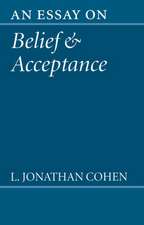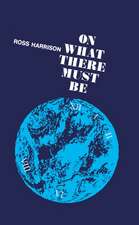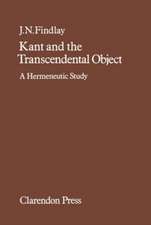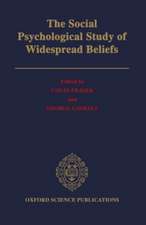Desiring the Good: Ancient Proposals and Contemporary Theory
Autor Katja Maria Vogten Limba Engleză Hardback – 14 sep 2017
| Toate formatele și edițiile | Preț | Express |
|---|---|---|
| Paperback (1) | 183.17 lei 10-16 zile | |
| Oxford University Press – 15 apr 2021 | 183.17 lei 10-16 zile | |
| Hardback (1) | 495.37 lei 31-37 zile | |
| Oxford University Press – 14 sep 2017 | 495.37 lei 31-37 zile |
Preț: 495.37 lei
Preț vechi: 636.47 lei
-22% Nou
Puncte Express: 743
Preț estimativ în valută:
94.80€ • 98.41$ • 79.05£
94.80€ • 98.41$ • 79.05£
Carte tipărită la comandă
Livrare economică 12-18 martie
Preluare comenzi: 021 569.72.76
Specificații
ISBN-13: 9780190692476
ISBN-10: 0190692472
Pagini: 232
Dimensiuni: 211 x 142 x 25 mm
Greutate: 0.36 kg
Editura: Oxford University Press
Colecția OUP USA
Locul publicării:New York, United States
ISBN-10: 0190692472
Pagini: 232
Dimensiuni: 211 x 142 x 25 mm
Greutate: 0.36 kg
Editura: Oxford University Press
Colecția OUP USA
Locul publicării:New York, United States
Recenzii
...her engagement with ancient ideas is creative and novel. Vogt's monograph is therefore an important contribution to scholarship in ancient philosophy. Furthermore, she enriches the contemporary ethical debate, since she offers an interesting and novel way to discuss the question of the good with regard to human agency, psychology and the metaphysics of human action.
Katja Maria Vogt proposes a refreshing, comprehensive, and intuitive Aristotle-cum-Plato inspired approach to ethics ... Her book is demanding yet rewarding ... Vogt's work lays a foundation that allows moral realists to be able to claim that there is a good for human beings and a good for individuals. This work is a welcome addition to Aristotelian ethics.
Vogt's book promises an exciting result: ancient ethics can not only influence but can be extended into contemporary thought. Vogt offers, inequal part, an exegetical account of ancient theories, and how they can be developed in such a way that they are brought into directconversation with the state-of-the-art in contemporary metaethics. [] I would recommend Vogt's book to anyone interested in ancientphilosophy and its contemporary applications. The book should also appeal to (historically-minded) philosophers working on action theory,ethics, and metaethics. Apart from providing a number of very interesting analyses of ancient texts, this book develops a systematic theory ofmotivation and the good which is worthwhile pursuing. The book is well produced with appealing photography on the dustjacket.
Vogt brings Aristotle's Nicomachean Ethics and Plato's Philebus, Euthyphro and Symposium into dialogue with contemporary authors such as Elizabeth Anscombe, J. David Velleman, Bernard Williams, George Edward Moore, Samuel Scheffler and Paul Boghossian. [...] Vogt's book is on the cutting edge of moral philosophy, metaphysics, theory of action and psychology. Theories that regard humans as 'angelic', as purely thinking beings, and that are averse to psychological and metaphysical contingencies, according to Vogt are necessarily defective. For this reason, she considers the good that agents are most familiar with, namely the good human life as they conceive of it, as a suitable starting point for ethical inquiry.
Vogt's book is an important and very welcome contribution for all those who are interested in developing an Aristotelian approach in the context of contemporary ethics. She puts into focus certain deficits of the contemporary discussion and provides a compelling example for how engagement with ancient texts can benefit the contemporary debate.
Katja Maria Vogt proposes a refreshing, comprehensive, and intuitive Aristotle-cum-Plato inspired approach to ethics ... Her book is demanding yet rewarding ... Vogt's work lays a foundation that allows moral realists to be able to claim that there is a good for human beings and a good for individuals. This work is a welcome addition to Aristotelian ethics.
Vogt's book promises an exciting result: ancient ethics can not only influence but can be extended into contemporary thought. Vogt offers, inequal part, an exegetical account of ancient theories, and how they can be developed in such a way that they are brought into directconversation with the state-of-the-art in contemporary metaethics. [] I would recommend Vogt's book to anyone interested in ancientphilosophy and its contemporary applications. The book should also appeal to (historically-minded) philosophers working on action theory,ethics, and metaethics. Apart from providing a number of very interesting analyses of ancient texts, this book develops a systematic theory ofmotivation and the good which is worthwhile pursuing. The book is well produced with appealing photography on the dustjacket.
Vogt brings Aristotle's Nicomachean Ethics and Plato's Philebus, Euthyphro and Symposium into dialogue with contemporary authors such as Elizabeth Anscombe, J. David Velleman, Bernard Williams, George Edward Moore, Samuel Scheffler and Paul Boghossian. [...] Vogt's book is on the cutting edge of moral philosophy, metaphysics, theory of action and psychology. Theories that regard humans as 'angelic', as purely thinking beings, and that are averse to psychological and metaphysical contingencies, according to Vogt are necessarily defective. For this reason, she considers the good that agents are most familiar with, namely the good human life as they conceive of it, as a suitable starting point for ethical inquiry.
Vogt's book is an important and very welcome contribution for all those who are interested in developing an Aristotelian approach in the context of contemporary ethics. She puts into focus certain deficits of the contemporary discussion and provides a compelling example for how engagement with ancient texts can benefit the contemporary debate.
Notă biografică
Katja Maria Vogt is Professor of Philosophy at Columbia University. She specializes in ancient philosophy, ethics, and normative epistemology. In her books and papers, she focuses on questions that figure both in ancient and in contemporary discussions: What are values? What kind of values are knowledge and truth? What does it mean to want one's life to go well?












